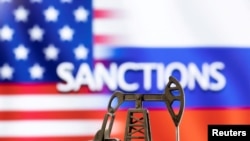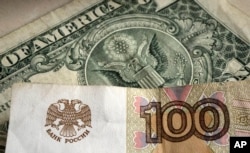At a December 15 video conference with the members of Russia’s Council for Strategic Development, President Vladimir Putin said his government had negated the effects of Western sanctions on the Russian economy.
“As you know, an unprecedented sanctions aggression has been launched against Russia… aimed at crushing our economy... As we can see – in fact, this is common knowledge – this plan has fallen through.”
Putin and other Russian government officials routinely say they have nullified the sanctions’ negative effect on their country’s economy.
Such claims distort the reality.
The economic part of the sanctions targets vast sectors of Russia's economy. They are intended to signal that the West is unified in supporting Ukraine and limit the Kremlin’s ability to supply its war by reducing national resources and crippling foreign trade.
Despite the temporary effects and possible backfiring of the restrictions, (more on this later) the sanctions in the long run are achieving their intended objectives.
First imposed for Russia’s destabilizing of eastern Ukraine and annexing of the strategically located Black Sea Crimean Peninsula in 2014, the sanctions have been expanding since Moscow’s full-fledged military invasion on February 24.
Speaking at a U.S. State Department briefing in August, experts with the Yale Chief Executive Leadership Institute said that the impact of sanctions on the Russian economy is “devastating.”
Based on the data collected for a comprehensive study of the Russian economic outlook, the CELI study concluded: “From our analysis, it becomes clear: business retreats and sanctions are catastrophically crippling the Russian economy.”
The study includes a list of some 1,100 private businesses that voluntarily pulled out of Russia in solidarity with Ukraine.
“Until this, there’s nothing like this in world history to have 1,100 plus companies – multinational companies voluntarily pull out,” said Professor Jeffrey Sonnenfeld of the Yale Chief Executive Leadership Institute.
“Putin is thus continuing to drain his budget into his war in Ukraine,” he “may need to defund other international or domestic campaigns in the process” and “risks facing a financial predicament in which he will not be able to balance maximalist goals in Ukraine with his global power projection campaigns,” the Washington-based Institute for the Study of War said in a December 12 report.
Apart from declaring economic invincibility to the sanctions in his speech to the Council, Putin also proclaimed the Russian ruble “one of the world’s strongest currencies.”
On the surface, Putin’s claim about the strength of the ruble appears to be accurate and confirmed by global financial market reports, at least for the first four months of 2022.
Experts, however, say it is “simply not true,” as explained by Steven Tian of the Yale Chief Executive Leadership Institute:
“Putin loves to talk about the Russian ruble and how strong it is. That’s simply not true; it’s an artificial exchange rate. It’s a reflection of capital controls.
Simply put, if you live in Russia right now, there is no legal way for you to obtain dollars. You can’t access dollar deposit accounts; you can’t buy dollars from the bank... And you can see the trading volume has plummeted across the ruble, showing that there’s a heavy premium being paid on the black market.”
One of the measures Russia has taken to support its currency is telling the buyers of its natural gas to pay in rubles. In March, members of the Group of Seven leading industrialized nations, or G-7, declined the demand as “one-sided” and a “clear breach of existing contracts.”
Russia has been using “the holes in the sanctions wall,” like Moscow’s ability to ensure a continued inflow of U.S. dollars by diverting its trade to the countries that did not join the sanctions, like China, India, and Turkey, an NPR story explained.
Domestically, Moscow adopted a policy of restrictions including the requirement for Russian businesses to bring 80% of their money from overseas back to Russia, in rubles, and banning Russian brokers from selling securities owned by foreigners, thus stocking the money inside the country, and keeping the ruble from falling.
Yet such “financial alchemy,” NPR said, is risky, as it only creates an illusion of strength, essentially creating “a Potemkin currency” – in a reference to the 18th century Russian government official who created fake villages to convince Empress Catherine of success.
“The head of the Central Bank of Russia, Elvira Nabiullina, is essentially playing Potemkin to Putin's Catherine, using a range of tools to make the ruble look like a currency that has value when in fact very few people outside Russia want to buy a single ruble unless they absolutely have to and when many people inside Russia don't really want rubles either.”
Moreover, the latest analysis by the Reuters news agency indicates that the efforts Russia put into creating the illusion of a strong ruble appear to be waning as the Russian currency hit a five-month low on December 15.
The critics predict sanctions fatigue, saying that restrictions on Russian oil and gas add urgency to the European countries’ efforts to establish other energy sources. Plus, the dramatic reduction of Russian supplies prompted an energy crisis in Europe and boosted consumer prices.
But there is a silver lining and a long-term benefit – analysts say freedom from dependency on Russian energy supplies gives Europe an opportunity to choose more reliable partners and focus on the transition to clean energy; it also deprives Moscow of further using its oil and gas for political blackmail.






